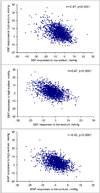Correlation between blood pressure responses to dietary sodium and potassium intervention in a Chinese population
- PMID: 19763120
- PMCID: PMC2885718
- DOI: 10.1038/ajh.2009.176
Correlation between blood pressure responses to dietary sodium and potassium intervention in a Chinese population
Abstract
Background: Blood pressure (BP) responses to dietary sodium and potassium intake vary among individuals. We examined the correlation between BP responses to dietary low-sodium, high-sodium, and potassium supplementation interventions in a feeding study.
Methods: A total of 1,906 Chinese aged > or = 16 years participated in the dietary intervention that included a 7-day low-salt intervention (51.3 mmol/day), a 7-day high-salt intervention (307.8 mmol/day), and a 7-day high-salt plus potassium supplementation (60 mmol/day) intervention. BP was measured nine times during the 3-day baseline observation and during the last 3 days of each intervention phase using a random-zero sphygmomanometer.
Results: The correlation coefficients (95% confidence intervals (CIs)) of the BP responses to low-sodium and high-sodium interventions were -0.47 (-0.51 to -0.44), -0.47 (-0.50 to -0.43), and -0.45 (-0.49 to -0.42) for systolic BP (SBP), diastolic BP (DBP), and mean arterial pressure (MAP), respectively (all P < 0.0001). The correlation coefficients (95% CI) of the BP responses to high-sodium intervention and potassium supplementation were -0.52 (-0.56 to -0.49), -0.48 (-0.52 to 0.45), and -0.52 (-0.55 to -0.48) for SBP, DBP, and MAP, respectively (all P < 0.0001). The kappa coefficients were moderate, varying from 0.28 to 0.34, between BP responses to low-sodium and high-sodium interventions (all P < 0.0001).
Conclusions: These results indicate there is a moderate correlation between BP responses to low-sodium and to high-sodium interventions, and BP responses to high-sodium intervention and potassium supplementation. Furthermore, our study suggests that individuals who were more sensitive to high-sodium diet might benefit more from a low-sodium and/or high-potassium intervention aimed at lowering BP levels.
Conflict of interest statement
Conflict of Interest: none.
Figures


References
-
- Kearney PM, Whelton M, Reynolds K, Muntner P, Whelton PK, He J. Global burden of hypertension: analysis of worldwide data. Lancet. 2005;365:217–223. - PubMed
-
- He J, Tell GS, Tang YC, Mo PS, He GQ. Relation of electrolytes to blood pressure in men. The Yi people study. Hypertension. 1991;17:378–385. - PubMed
-
- Chobanian AV, Hill M. National Heart, Lung, and Blood Institute Workshop on Sodium and Blood Pressure : a critical review of current scientific evidence. Hypertension. 2000;35:858–863. - PubMed
-
- Cutler JA, Follmann D, Allender PS. Randomized trials of sodium reduction: an overview. Am J Clin Nutr. 1997;65:643S–651S. - PubMed
Publication types
MeSH terms
Substances
Grants and funding
LinkOut - more resources
Full Text Sources
Medical
Molecular Biology Databases

